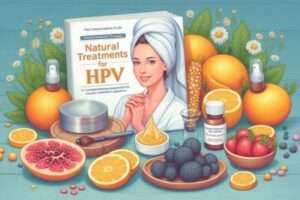Natural Treatments for HPV: A Comprehensive Guide to Complementary Therapies
Have you been diagnosed with HPV and are curious about natural treatment options? While there’s no cure for the human papillomavirus (HPV), many people are turning to natural remedies to manage symptoms and boost their immune system. In this comprehensive guide, we’ll explore various natural treatments for HPV, their potential benefits, and how they can complement conventional medical approaches.
Butyric Acid: The Gut-Friendly Compound You Need to Know About

Table of Contents
ToggleUnderstanding HPV
Before we dive into natural treatments, let’s briefly review what HPV is and how it affects the body. Human papillomavirus is the most common sexually transmitted infection worldwide. According to the Centers for Disease Control and Prevention (CDC), nearly everyone will get at least one type of HPV at some point in their lives.
There are over 200 types of HPV, with some causing genital warts and others potentially leading to various cancers, including cervical, anal, and oropharyngeal cancers. While most HPV infections clear up on their own within two years, some persist and may require treatment.
Syphilis Testing: A Comprehensive Guide to Diagnosis and Screening

The Role of Natural Treatments
Natural treatments for HPV aim to:
1. Boost the immune system to help the body fight off the virus
2. Reduce symptoms associated with HPV, such as genital warts
3. Promote overall health and well-being
It’s important to note that while natural treatments can be beneficial, they should not replace conventional medical care. Always consult with your healthcare provider before starting any new treatment regimen.
Oral Gonorrhea: A Comprehensive Guide to Symptoms, Diagnosis and Treatment
Dietary Approaches for HPV Management
A healthy diet plays a crucial role in supporting your immune system and overall health. Here are some dietary strategies that may help manage HPV:
Hepatitis A, B, and C: Understanding the Differences and Similarities

1. Increase Antioxidant-Rich Foods
Antioxidants help protect your cells from damage and may boost your immune system. Foods high in antioxidants include:
– Berries (blueberries, strawberries, raspberries)
– Leafy greens (spinach, kale, collard greens)
– Colorful vegetables (bell peppers, carrots, sweet potatoes)
– Green tea
– Dark chocolate (in moderation)
Understanding Hepatitis B: Transmission, Prevention and Treatment
2. Consume More Cruciferous Vegetables
Cruciferous vegetables contain compounds that may help fight HPV. Include these in your diet:
– Broccoli
– Cauliflower
– Brussels sprouts
– Cabbage
– Kale
3. Boost Your Folate Intake
Folate, a B vitamin, may help prevent HPV-related cervical changes. Good sources include:
– Leafy greens
– Legumes
– Fortified grains
– Oranges
4. Include Probiotic-Rich Foods
Probiotics support gut health and may boost your immune system. Try incorporating:
– Yogurt
– Kefir
– Sauerkraut
– Kimchi
– Kombucha
Herbal Remedies and Supplements
Several herbs and supplements have shown promise in supporting the immune system and potentially fighting HPV. However, it’s crucial to consult with a healthcare provider before starting any supplement regimen, as some may interact with medications or have side effects.
1. Green Tea Extract
Green tea contains polyphenols that may have antiviral and anti-tumor properties. Some studies suggest it may help clear HPV infections and reduce the risk of cervical cancer.
2. Curcumin
Found in turmeric, curcumin has anti-inflammatory and antioxidant properties. Research indicates it may help suppress HPV and reduce the risk of HPV-related cancers.
3. AHCC (Active Hexose Correlated Compound)
This mushroom extract has shown promise in boosting immune function and potentially clearing HPV infections. A 2014 study published in Frontiers in Oncology found that AHCC supplementation led to HPV clearance in some patients.
4. Indole-3-Carbinol (I3C)
Found in cruciferous vegetables, I3C may help prevent HPV-related cervical changes. Some studies suggest that I3C supplements could be beneficial for women with HPV-related cervical dysplasia.
5. Echinacea
Known for its immune-boosting properties, echinacea may help the body fight off viral infections, including HPV.
Lifestyle Changes to Support HPV Management
In addition to dietary changes and supplements, certain lifestyle modifications can support your body in managing HPV:
1. Quit Smoking
Smoking weakens the immune system and increases the risk of HPV persistence and related cancers. Quitting smoking can significantly improve your body’s ability to fight off HPV.
2. Manage Stress
Chronic stress can weaken your immune system. Incorporate stress-reduction techniques such as:
– Meditation
– Yoga
– Deep breathing exercises
– Regular exercise
3. Get Adequate Sleep
Quality sleep is essential for a strong immune system. Aim for 7-9 hours of sleep per night.
4. Practice Safe Sex
While it may not directly treat HPV, practicing safe sex can prevent reinfection and reduce the risk of contracting other STIs that could further compromise your immune system.
Topical Natural Treatments for Genital Warts
For those dealing with genital warts caused by HPV, some natural topical treatments may help:
1. Tea Tree Oil
Known for its antiviral properties, tea tree oil may help reduce the appearance of genital warts. Always dilute it with a carrier oil before applying to sensitive skin.
2. Green Tea Extract Ointment
Some studies suggest that topical green tea extract ointment may be effective in treating genital warts.
3. Apple Cider Vinegar
While more research is needed, some people report success in using apple cider vinegar to treat genital warts. However, it can cause skin irritation and should be used with caution.
The Importance of Medical Supervision
While natural treatments can be beneficial, it’s crucial to maintain regular check-ups with your healthcare provider. They can monitor your HPV status, perform necessary screenings, and ensure that any natural treatments you’re using are safe and effective for your individual case.
Conclusion
Managing HPV naturally involves a holistic approach that includes a healthy diet, immune-boosting supplements, and lifestyle changes. While these natural treatments can complement conventional medical care, they should not replace it. Always consult with your healthcare provider before starting any new treatment regimen.
Remember, most HPV infections clear on their own within two years. By supporting your immune system and overall health, you can give your body the best chance to fight off the virus naturally.
Reference to External Sources:
1. Centers for Disease Control and Prevention (CDC) – HPV Fact Sheet:
2. National Center for Complementary and Integrative Health – HPV:
3. World Health Organization (WHO) – Human papillomavirus (HPV) and cervical cancer:
4. National Cancer Institute – HPV and Cancer:
5. Journal of Lower Genital Tract Disease – Natural Approaches to HPV:


